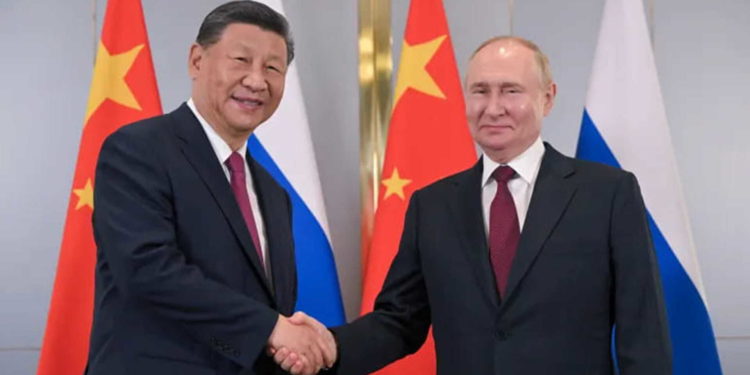China and Russia Highlight Significant Changes in Global Politics at the Shanghai Cooperation Organisation (SCO) Summit. Both states are advocating for a new global order, advising nations to discourage outside interference and assist one another in keeping stability and progress. Russian President Vladimir Putin and Chinese President Xi Jinping made their positions known at the recent Shanghai Cooperation Organization (SCO) summit in Astana, Kazakhstan, where this message was given.
President Xi emphasized throughout the meeting how crucial it is to keep the peace and prosperity in the region by standing up to outside influence and encouraging one another. He stressed the need for the SCO to be on the “right side of history,” promoting justice and fairness in international affairs. Putin agreed, pointing out that there is a move away from US domination as new political and economic power centers are emerging.
The message from Russian President Vladimir Putin and Chinese President Xi Jinping was clear-cut: new centers of power are arising as the globe changes. They view the SCO as a check on the might of the US. Assuring regional peace and development, Xi urged member nations to stand up to outside meddling and help one another during the meeting. He underlined the significance of advancing justice and fairness worldwide to be on the “right side of history.”
Could China and Russia be Catalysts for change in International Relations?
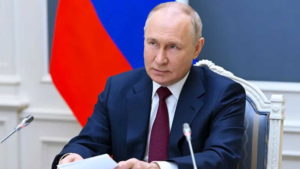
Two of the most powerful countries in the world, China and Russia, can significantly alter international relations. Their developing coalition and strategic goals have the potential to significantly alter world politics in several areas, including economic policy and military alliances. This is how their acts could lead to change on a global scale.
The joint threat to US supremacy by China and Russia is one of the partnership’s most obvious effects. The United States has dominated international politics, economics, and security for many years as the main superpower in the world. But as their partnership grows, China and Russia offer a strong counterweight to US power. This might result in a more multipolar world, with power divided more fairly among numerous important actors, which would promote a more stable and balanced international order.
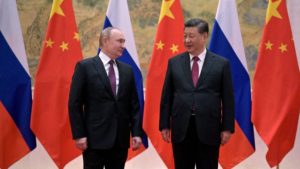
Furthermore, China and Russia have been collaborating closely on numerous economic projects that can provide alternatives to the financial systems dominated by the West. For instance, their cooperation on energy pipelines and the Belt and Road Initiative lessens their dependency on Western markets. They allow other nations more options by establishing new trade channels and economic alliances, which may lessen the dominance of Western institutions in the global economy and promote a more diverse global economy.
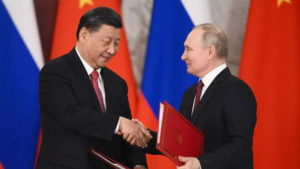
China and Russia frequently back one another in international bodies like the United Nations when it comes to politics. They can balance out Western initiatives by coordinating their use of veto power and influence over important decisions. By advancing a narrative that supports sovereignty and non-interference, this political alignment has the power to change the dynamics of international diplomacy and may appeal to other countries looking to reclaim their independence from Western influence.
Nevertheless, Russia and China have the aptitude to significantly influence changes in international relations. Their joint ventures, economic plans, military collaboration, and diplomatic activities question the existing world order and advance a multipolar world. They can change the dynamics of world politics and open doors for a more diversified and balanced international order by promoting multilateralism and providing alternatives to Western-dominated institutions. Their influence will probably have a significant impact on international relations as it grow, bringing about change and encouraging fresh ideas for global collaboration and governance.
The members of the Shanghai Cooperation Organization (SCO) recognized the “tectonic shifts in global politics” and stressed the necessity for the bloc to strengthen its role in regional and global security in a joint statement. They drew attention to the mounting threats to world stability posed by the use of force, transgressions of international law, and expanding geopolitical clashes and conflicts. The group validated their dedication to resolving international conflicts by calling for an “early, complete and sustainable ceasefire” in Gaza as well as a thorough resolution of the Palestinian issue.
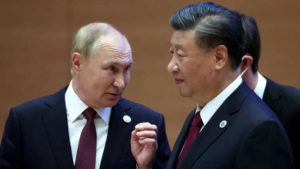
The proclamation emphasized respect for each other’s sovereignty, independence, and territorial integrity, even though it refrained from specifically mentioning China’s issues in the Asia-Pacific region or Russia’s actions in Ukraine. This position is consistent with both countries’ long-standing resistance to what they see as US meddling in their local affairs.
Moreover, during the meeting, Belarus became the tenth member of the bloc, a development that Putin welcomed as proof of the growing number of nations supporting a just global order. Reflecting the bloc’s growing prominence, he made comments on the establishment of new centers of power and economic expansion.
Shanghai Cooperation Organisation was founded in 2001 and since then it has been more well-known as a forum for collaboration, especially in areas of economic and security. Major regional powers including Kazakhstan, Pakistan, India, and Iran are among its members; together, they account for around 30% of the global GDP and 40% of the world’s population.
The future of international relations will be significantly shaped by the relationship between China and Russia. Their collaboration in the political, military, and economic domains can probably continue to shape world events, upending established hierarchies of power and advancing a more equitable international system.


